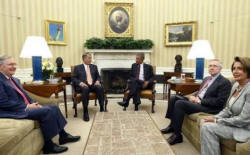|
 Ahead
of speech, Obama briefs Congress on Islamic State strategy Ahead
of speech, Obama briefs Congress on Islamic State strategy
 Send a link to a friend
Send a link to a friend
[September 10, 2014]
By Steve Holland and Jeff Mason
WASHINGTON (Reuters) - President Barack
Obama told leaders of Congress on Tuesday that he did not need for them
to authorize his strategy to fight Islamic State, ahead of a speech to
Americans that may herald expanded operations against the group in Iraq
and perhaps Syria.
|
|
 Obama's White House speech at 9 p.m. ET on Wednesday (0100 GMT on
Thursday) will be his most significant effort to outline a strategy
against a group whose savage methods have included the beheading of
two American captives. Obama's White House speech at 9 p.m. ET on Wednesday (0100 GMT on
Thursday) will be his most significant effort to outline a strategy
against a group whose savage methods have included the beheading of
two American captives.
Obama met Harry Reid and Nancy Pelosi, the top Democrats in the U.S.
Senate and House of Representatives, and Republican counterparts
Mitch McConnell and John Boehner, to discuss the next phase of his
campaign.
"The president told the leaders that he has the authority he needs
to take action against ISIL in accordance with the mission he will
lay out in his address tomorrow night," the White House said in a
statement, using an acronym for Islamic State.
The 1973 War Powers Resolution requires that the president consult
Congress before introducing U.S. armed forces into hostilities but
allows them to remain for 60 days before he has to obtain Congress'
approval for action.
Elected in 2008 on a promise to get U.S. troops out of Iraq, Obama
has been limiting military operations to protecting minority Iraqi
Yazidis and attacking Islamic State positions near the Kurdish
capital Arbil and around the Mosul and Haditha dams.

He has the option of ordering air strikes on an expanded list of
targets within Iraq and has been considering strikes in Syria as
well, on condition that moderate rebels be in a position to hold
territory cleared of Islamic State fighters by the strikes.
Obama said in an interview with NBC broadcast on Sunday that the
United States would hit the militant leaders wherever it could.
A Washington Post-ABC News opinion poll on Tuesday said 71 percent
of Americans support air strikes in Iraq and 65 percent support
using them in Syria. It found Obama's approval rating was at
near-record lows, with only 43 percent saying he is a strong leader.
Iraq's formation on Monday of a unity government involving
disenfranchised Sunni and Kurdish minorities met U.S. demands and
cleared the way for increased American military assistance, White
House spokesman Josh Earnest told reporters.
ISLAMIC STATE THREAT
Policymakers in recent weeks have called Islamic State a threat to
the U.S. homeland out of concern that foreign fighters who have
sworn allegiance to the group, including some Americans, could
return home to attack civilians.
In the White House meeting, Speaker of the House Boehner expressed
support for options Obama has proposed including "increasing the
effectiveness of the Iraqi Security Forces" and equipping some
groups in the Syrian opposition, an aide said.
[to top of second column]
|

"The Speaker made it clear that ISIL (Islamic State) is preparing to
fight us, and that as we learned in Syria, the longer we wait, the
more difficult our choices become," the aide said.
Obama will pledge that large numbers of U.S. ground forces will not
be deployed. The United States has more than 800 military personnel
in Iraq to provide protection for American embassy personnel and
serve as forward spotters for air strikes.
Obama ran for president by declaring he would end the Iraq war begun
by President George W. Bush and the last combat troops were pulled
out in 2011.
Obama is tying deeper U.S. military involvement to creating an
international coalition so that the United States does not act
alone. Secretary of State John Kerry is in Saudi Arabia and Jordan
this week seeking active support from Arab states.
Obama has been harshly criticized by Republicans and even some
Democrats for what they call a tentative response to the Islamic
State challenge. In late August he said "we don't have a strategy
yet" for tackling Islamic State in Syria.
House Republicans invited former Vice President Dick Cheney, a
Republican and an Obama critic, to address their weekly caucus
meeting on Tuesday. Attendees said Cheney, an architect of the 2003
Iraq invasion, blamed Obama for international instability.
(Additional reporting by David Lawder, Roberta Rampton and Patricia
Zengerle; Editing by David Storey and Howard Goller)
[© 2014 Thomson Reuters. All rights
reserved.] Copyright 2014 Reuters. All rights reserved. This material may not be published,
broadcast, rewritten or redistributed.

 |